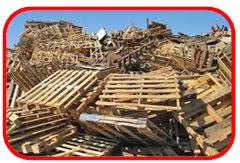Biofiba Limited of Australia has announced plans to begin marketing a new biodegradable material that can be used to make pallets, which could offer cost and Sustainability advantages in global trade.
Pallets are used for a substantial amount of global trade movements, and the wood needed to make these pallets may represent as much as 40% of total global timber use.
There are often a variety of disposal issues related to wood pallets as well, especially if they have been chemically treated. Plastic pallets might provide a solution, but are very expensive and difficult for the shipping company to reclaim on a global basis, so wood is the platform of choice for global commerce.
Biofiba proposes to change the current equation by development of a new material that can be used to build export pallets in place of wood.
The company, whose product goes by the same name, says Biofiba is made of 100% natural organic matter sourced from commercially grown renewable crops (which does not affect the food chain). That material, which is calls “organic simulated timber,” is then processed and extruded into planks that have been specifically developed as an environmentally acceptable alternative to wood, plastic and polystyrene in the production of export shipping pallets.
The company does not plan to actually produce the pallets themselves, but rather to offer these biodegradable planks that pallet manufacturers around the world would use to create the pallets locally.
According to managing director Laurence Dummett, Biofiba is finalizing its development efforts to prove manufacturability, while in parallel developing a global network of licensees which will buy the planks from Biofiba to produce pallets. He says the company has already signed up these partners in the US, Europe and various areas of Asia.
It appears the planks will initially be produced in some six different factories around the globe, including one in India where most of the testing has been performed.
Dummett expects the cost per pallet for a Biofiba pallet to be about the same or maybe even less than a wood pallet – before disposal costs.
Biodegradability is the key, Dummett told SCDigest.
 “An export pallet has a very short working life, with the time from manufacture to end of shipment averaging about 45 days,” Dummett said. “Biofiba is designed to bio-degrade within 180 days after its working life.” “An export pallet has a very short working life, with the time from manufacture to end of shipment averaging about 45 days,” Dummett said. “Biofiba is designed to bio-degrade within 180 days after its working life.”
It appears the company still has a few hurdles to overcome, including acquire a new round of investments and final commercialization of the technology, but it is receiving some funding and support from the Australian government.
It is definitely a technology global logistics managers should keep an eye on.
Is there a market need for this kind of technology for export pallets? How has your company been looking at this? Let us know your thoughts at the Feedback button below.

TheGreenSupplyChain.com is now Twittering! Follow us at www.twitter.com/greenscm
|